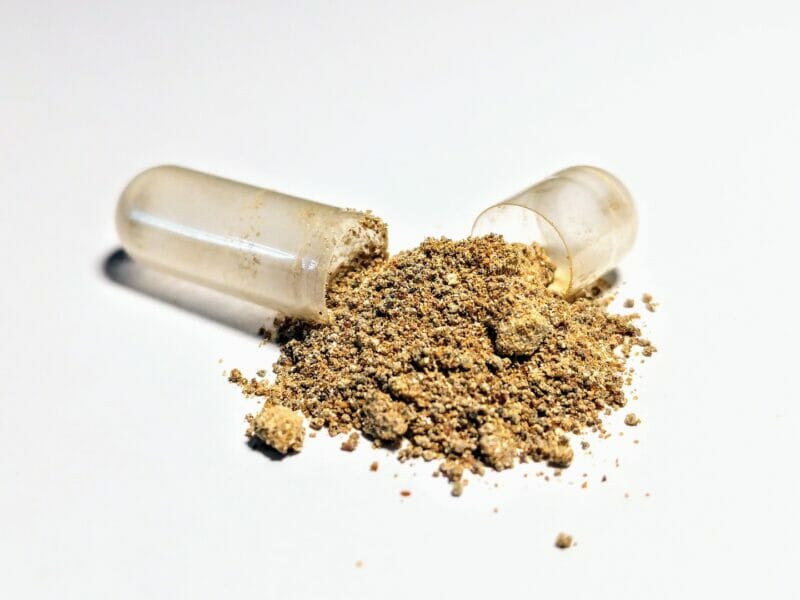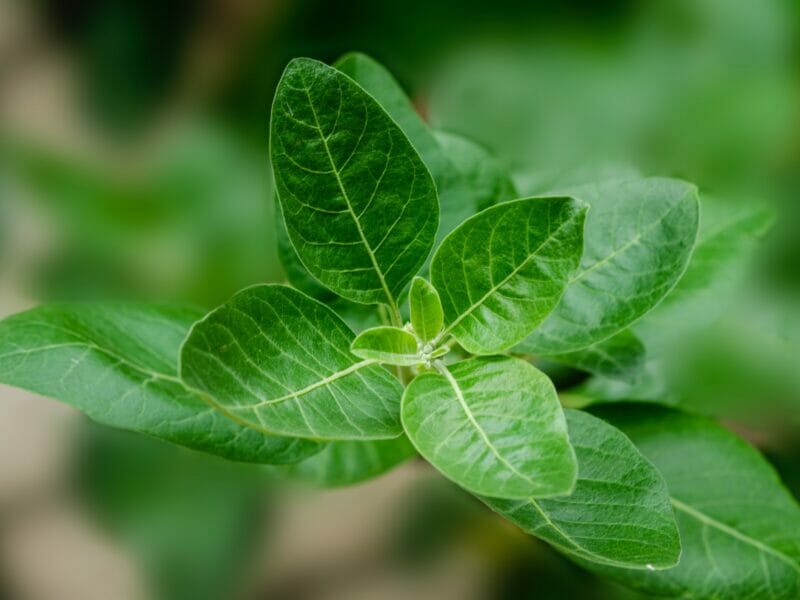Use of Ashwagandha
Ashwagandha, also known as Withania somnifera, is an Ayurvedic herb that has been used for centuries in traditional Indian medicine. It is known for its adaptogenic, anti-inflammatory, and antioxidant properties, and is often referred to as Indian ginseng or winter cherry. The root extract of ashwagandha is used in Ayurvedic rasayana, a form of Ayurvedic medicine, to help the body cope with stress and improve overall quality of life. Studies suggest that ashwagandha may have a beneficial effect on the nervous system, reproductive system, and immune system.
The use of ashwagandha has been studied in clinical trials for its efficacy and safety. Studies have found that taking ashwagandha root extract or ashwagandha powder may reduce stress and anxiety, improve physical and mental performance, and help with rheumatoid arthritis. It has also been found to have an anxiolytic effect, and may help reduce inflammation and improve the immune system. The root extract of ashwagandha has also been found to have analgesic activity, and may help reduce the effects of depression and improve the overall quality of life.
Effect of Ashwagandha
Ashwagandha is an herbal remedy that has been used in Ayurvedic medicine for centuries. It is derived from the root of the Withania somnifera plant, also known as Indian ginseng. It has been used to treat a variety of ailments, including anxiety and depression. Studies have shown that ashwagandha may increase efficacy and safety of treatment with ashwagandha, and support the use of ashwagandha for its pharmacological actions. A placebo-controlled clinical study found that taking 600 mg per day of organic ashwagandha root extract may be helpful in reducing anxiety and depression.

In addition to its effects on anxiety and depression, ashwagandha has also been studied for its potential to reduce pain. A study of the analgesic activity of ashwagandha root extract found that it may reduce pain and inflammation. However, it is important to note that large doses of ashwagandha may cause possible side effects, so it is important to consult with a healthcare professional before taking ashwagandha supplements.
Additionally, it is important to note that ashwagandha is traditionally used in Ayurvedic medicine, and should be used with caution as it may interact with other medications.
Properties of Ashwagandha
Ashwagandha is an ancient medicinal herb that has been used in Ayurveda for centuries. It is derived from the root of the Withania somnifera plant, and is known for its potential to provide a variety of health benefits. Studies have shown that ashwagandha may be helpful in reducing stress, improving cognitive function, and providing immunomodulatory and CNS effects.
In addition, ashwagandha has been found to have a beneficial effect on the cardiovascular system, and may be helpful in reducing inflammation.
The safety and efficacy of ashwagandha root extract has been studied extensively, and it has been found to be safe when taken in doses of up to 600 mg per day. In addition, studies have shown that ashwagandha can be used to reduce anxiety and depression, and may be helpful in improving overall health. Furthermore, ashwagandha has been found to have a positive impact on the immune system, and may be beneficial in reducing the risk of certain diseases. Overall, ashwagandha is a popular medicinal herb that has been used for centuries, and its potential to provide a variety of health benefits is well-documented.
Benefits of Ashwagandha
Wow, the benefits of Ashwagandha are truly amazing! This root extract of Withania somnifera has been used for centuries in the Ayurvedic system of medicine and is now gaining popularity in the West. An overview on Ashwagandha reveals that it has a wide range of potential benefits, from reducing stress and anxiety to improving cognitive function.
Studies have found that Ashwagandha can reduce stress and anxiety, improve cognitive function, and even reduce the effects of aging. In one study, the efficacy and safety of Ashwagandha root extract was tested in a group of healthy adults. After 8 weeks of supplementation with 300 mg of Ashwagandha, it was found that Ashwagandha had a beneficial effect on stress and anxiety levels. Additionally, the study found that Ashwagandha had no adverse effects and was safe to use. Wow, that’s impressive! It’s no wonder that Ashwagandha is considered one of the most powerful herbs in the world.
Adaptogenic
Adaptogenic herbs have been used for centuries to help the body cope with stress and improve overall health. One of the most popular adaptogenic herbs is Withania somnifera, also known as ashwagandha. A study of ashwagandha found that the root extract of Withania somnifera had a beneficial effect on the body, including the central nervous system (CNS) effects of sitoindosides. The impact of ashwagandha was further studied in a study that looked at the effect of an ashwagandha aqueous extract on the body.

The results of the study showed that ashwagandha was found to have potential for improving overall health.
Ashwagandha has been used for centuries in traditional medicine and is commonly found in Ayurvedic medicine. It is known to have a variety of uses, including the ability to increase energy levels, reduce stress, and improve cognitive function.
In addition, ashwagandha contains a variety of compounds that have been shown to have beneficial effects on the body. Studies have reported that ashwagandha supplementation can have additive effects on the body, and it has been suggested that it can be used to improve overall health. However, it is important to note that it is important to avoid using ashwagandha in combination with certain medications, such as lorazepam, as it can increase the risk of side effects.
Anti-inflammatory
When it comes to anti-inflammatory effects, Withania somnifera, also known as ashwagandha, is a powerful herb. The root extract of this plant has been used for centuries in traditional medicine to treat a variety of ailments. Studies have shown the potential of ashwagandha to reduce inflammation and its beneficial effect on the body. An aqueous extract of ashwagandha has been found to have anti-inflammatory properties, and ashwagandha is commonly used in Ayurvedic medicine to treat inflammation.
In one study, ashwagandha and lorazepam were compared to see which had the most anti-inflammatory effects. The results showed that ashwagandha can increase the anti-inflammatory effects of lorazepam. Other studies have also reported the anti-inflammatory effects of ashwagandha. One study included ashwagandha and reported significant anti-inflammatory effects. This shows the potential of ashwagandha to reduce inflammation and its beneficial effects on the body.
Anxiolytic
I’m feeling a bit anxious lately, and I’m looking for a natural way to reduce my stress. I’ve heard about the anxiolytic effects of Withania somnifera, also known as ashwagandha. This root extract has been used for centuries in Ayurvedic medicine to help reduce stress and anxiety. I’m curious to learn more about the beneficial effects of ashwagandha and how it can help me.
I’ve done some research and found that ashwagandha has been used to treat a variety of conditions, including anxiety, insomnia, and depression. It’s also been reported to have a calming effect on the body and mind. Studies have shown that ashwagandha significantly reduces stress and anxiety levels, and can even improve cognitive function. I’m excited to try it out and see if it can help me reduce my stress and anxiety.
Effects on the Nervous System
Wow, ashwagandha is also known as Withania somnifera root extract and it has some amazing effects on the nervous system! It’s no wonder that the root of ashwagandha has been used for centuries in Ayurvedic medicine. From reducing stress and anxiety to improving sleep quality, the ashwagandha uses are numerous.
The effects reported are quite remarkable. It’s been found to reduce cortisol levels, which can help to reduce stress and anxiety. It can also help to improve cognitive function, reduce inflammation, and even improve mood. Plus, it can help to improve sleep quality, which is essential for a healthy nervous system. All in all, the effects of ashwagandha on the nervous system are quite impressive!
Central Nervous System
Wow, the Central Nervous System is an amazing thing! It’s the control center of the body, responsible for coordinating and controlling all of our movements, thoughts, and emotions. It’s made up of the brain, spinal cord, and a network of nerves that connect to the rest of the body. It’s no wonder that ashwagandha is also known as the “king of herbs” – withania somnifera root extract has been used for centuries to support the nervous system and help reduce stress.

The root of ashwagandha is known for its calming effects, and ashwagandha uses range from reducing anxiety and stress to improving cognitive function. It’s also been reported to help with sleep, energy levels, and even libido. Plus, it’s been used to help with inflammation, pain, and even cancer. With all these amazing effects reported, it’s no wonder ashwagandha is so popular!
Peripheral Nervous System
Wow, the peripheral nervous system is a fascinating thing! It’s responsible for connecting the central nervous system to the rest of the body, and it’s made up of sensory neurons, motor neurons, and the autonomic nervous system. It’s amazing how it works to keep us functioning!
One of the most interesting things about the peripheral nervous system is that it can be affected by ashwagandha, also known as withania somnifera root extract. This root of ashwagandha has been used for centuries in Ayurvedic medicine, and it’s known for its calming and restorative effects. Studies have reported that ashwagandha uses can help to reduce stress and anxiety, improve sleep, and even boost cognitive performance. It’s no wonder that this ancient root extract is still being used today!
How to Use Ashwagandha
Ah, ashwagandha! It’s the root of all good health. This withania somnifera root extract has been used for centuries in Ayurvedic medicine to treat a variety of ailments. But what are the ashwagandha uses? Well, it’s been reported to have a number of positive effects, including reducing stress and anxiety, improving cognitive function, and boosting energy levels.
So, how do you use ashwagandha? Well, it’s available in a variety of forms, including capsules, powders, and teas. You can also find it in topical creams and lotions. Depending on the form you choose, you can take it once or twice a day. It’s important to note that the effects of ashwagandha can vary from person to person, so it’s best to consult with your doctor before taking it. Who knows, you might just find the root of all good health!
Dosage
When it comes to dosage, ashwagandha is also known as withania somnifera root extract and is typically taken in the form of a capsule or powder. The root of ashwagandha is known to have a variety of ashwagandha uses, and the effects reported are usually positive. Depending on the individual, the recommended dosage can range from 500mg to 3000mg per day. It’s important to note that the dosage should be tailored to the individual’s needs and should be discussed with a healthcare professional.
When taking ashwagandha, it’s important to start with a lower dosage and gradually increase it over time. This will help to ensure that the body is able to adjust to the effects of the root extract and that any potential side effects are minimized. Additionally, it’s important to note that ashwagandha should not be taken in combination with other medications or supplements without consulting a healthcare professional.

Forms
Ah, forms! They come in all shapes and sizes, from the mundane to the complex. But no matter what form you’re dealing with, they all have one thing in common: they’re a necessary part of life. Take ashwagandha, for example. This withania somnifera root extract has been used for centuries to treat a variety of ailments, and its effects are reported to be quite powerful. From reducing stress and anxiety to improving cognitive function, the root of ashwagandha has a wide range of ashwagandha uses. And while it’s not a form in the traditional sense, it’s still a form of medicine that requires careful consideration.
Forms are everywhere, and they can be a real pain. But they’re also a necessary part of life, and they can be used to great effect. Whether it’s a form of medicine like ashwagandha, or a form of paperwork, forms can be used to make life easier and more efficient. So don’t be afraid to take advantage of the many ashwagandha uses and effects reported, and don’t be afraid to fill out a form or two. After all, it’s all part of life!
Potential Side Effects
Taking ashwagandha is also known to have potential side effects. Withania somnifera root extract, the root of ashwagandha, has been used for centuries in Ayurvedic medicine for its many ashwagandha uses. However, there have been some effects reported that should be taken into consideration.
Oh wow, some of the potential side effects include nausea, diarrhea, and upset stomach. Yikes! Additionally, some people have reported feeling drowsy or having difficulty sleeping after taking ashwagandha. It’s important to be aware of these effects and to talk to your doctor before taking ashwagandha. Whoa, it’s always better to be safe than sorry!
Conclusion
Ashwagandha, also known as Withania somnifera, is a root extract that has been used for centuries in traditional Indian medicine. It is known for its many health benefits, including its ability to reduce stress, improve cognitive function, and boost the immune system. The root of ashwagandha is used to make a variety of products, including capsules, tablets, and teas.

The effects reported from using ashwagandha are numerous. It has been shown to reduce stress and anxiety, improve cognitive function, and boost the immune system. It has also been used to treat insomnia, depression, and fatigue.
Additionally, ashwagandha has been used to improve physical performance, reduce inflammation, and improve heart health.
Overall, ashwagandha is a powerful root extract with many potential health benefits. It has been used for centuries in traditional Indian medicine and is now gaining popularity in the Western world. It is available in a variety of forms, including capsules, tablets, and teas. The effects reported from using ashwagandha are numerous, including reduced stress and anxiety, improved cognitive function, and boosted immunity. For those looking to improve their overall health, ashwagandha is a great option.
FAQ’s:
Q1. What is ashwagandha?
A1. Ashwagandha is an herb derived from the root of Withania somnifera, also known as Indian ginseng.
Q2. What are the uses of ashwagandha?
A2. Ashwagandha is used for a variety of purposes, including reducing stress, improving cognitive function, and boosting the immune system.
Q3. What are the effects reported from taking ashwagandha?
A3. The effects reported from taking ashwagandha include improved mood, increased energy, and improved sleep.
Q4. Is ashwagandha also known as Indian ginseng?
A4. Yes, ashwagandha is also known as Indian ginseng.
Q5. What is the root of ashwagandha?
A5. The root of ashwagandha is derived from Withania somnifera.
Q6. What are the benefits of taking ashwagandha?
A6. The benefits of taking ashwagandha include reduced stress, improved cognitive function, and increased energy.
Q7. Is ashwagandha safe to take?
A7. Yes, ashwagandha is generally considered safe to take when used in recommended doses.



 Exploring Rhodiola Rosea Research And Studies
Exploring Rhodiola Rosea Research And Studies
